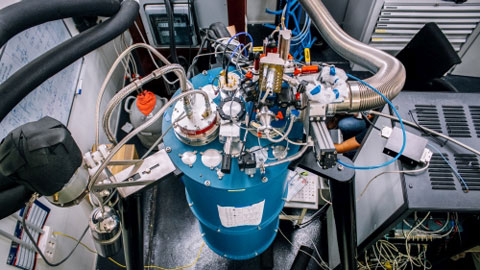IFAE coordinates the project AVaQus to develop new quantum computing technologies

The project has been selected by the European Commission to receive a FET-Open grant. It brings together European research groups and companies to overcome the limitations of current annealing devices by applying the latest developments in superconducting quantum circuits.
02/04/2020
The AVaQus project, coordinated by the newly created Quantum Computing Technologies group at the Institut de Física d’Altes Energies (IFAE), at the UAB, is one of the 49 projects selected by the European Commission to receive the FET-Open grants in the call 2019.
The project brings together European research groups and companies to overcome the limitations of current annealing devices by applying the latest developments in superconducting quantum circuits. AVaQus will build and operate a quantum annealer prototype with 5 qubits with high connectivity, tunable interactions and long coherence times.
"Over the next three years we want to develop the core technology for building next-generation devices capable of performing quantum computation and simulation tasks that might rival classical computers in the long-term", says Dr. Pol Forn-Díaz, head of the IFAE Quantum Computing Technologies group and AVaQus project coordinator.
Europe’s bet on quantum annealing
AVaQus is the first European-funded large-scale project on quantum annealing and it will lead to the consolidation of quantum annealing hardware as a research field in Europe, and potentially as a future European quantum technology.
The total funds allocated to this project amount to 3 million euros for a duration of 3 years.
The project consortium is composed of 8 European partners, 5 research centers and 3 quantum startups :
● Institut de Física d’Altes Energies (IFAE), Barcelona (Spain), acting as the coordinator of AVaQus.
● Karlrsruher Institut für Technologie (KIT), Karlsruhe (Germany).
● Centre National de la Recherche Scientifique (CNRS), Grenoble (France).
● University of Glasgow (UG), Glasgow (UK).
● Consejo Superior de Investigaciones Científicas (CSIC), Madrid (Spain).
● Delft Circuits (DELFT), Delft (The Netherlands).
● Qilimanjaro Quantum Tech, S.L. (QILI), Barcelona (Spain).
● HQS Quantum Simulations (HQS), Karlsruhe (Germany).
Together, they will develop all the hardware components and software to operate quantum annealer prototypes.
IFAE will operate as one of the two integration nodes together with KIT, assembling the components designed and developed by the partners CNRS, UG and DELFT. CSIC, QILI and HQS will be the teams developing the quantum software and applications to be run on the coherent quantum annealer developed by the experimental teams.
The project will collaborate with other European initiatives in quantum computing such as OpenSuperQ from the FET Flagship on Quantum Technologies (FET-QT), and Quantera-funded project SiUCs, also coordinated by IFAE.
A promising alternative to gate-based quantum computers
Most of today’s world-wide quantum computing research is focused on universal gate-based quantum computers. But this approach requires large numbers of qubits and quantum error correction to achieve meaningful results. This is why, quantum computing companies (Google, IBM, Intel, etc.) and European-funded projects such as OpenSuperQ develop instead Noisy Intermediate Scale Quantum (NISQ) devices that may perform useful tasks without quantum error correction. There is no evidence yet that NISQ devices can outperform classical computing, but a worldwide effort is being made to obtain useful applications in the short- to mid-term.
AVaQus focuses on an alternative approach by building instead analog quantum computers such as quantum annealers. The type of quantum processors proposed by AVaQus might offer more tolerance to the type of errors that plague gate-based quantum processors and thus a short-term transformative potential as an alternative to universal quantum computers.
Beyond the state-of-the-art of quantum annealing
Current quantum annealing developers, despite the remarkable technological feat of having built circuits containing more than 2000 qubits, have so far not been able to show evidence of a quantum speedup over classical computers. Enhanced qubit coherence combined with novel qubit-qubit coupling elements might be the missing ingredients to display an advantage in real-world applications.
AVaQus banks on the progress of superconducting quantum technology to attempt a technological breakthrough: the first superconducting coherent quantum annealer able to perform quantum computation and simulation tasks using hardware designed for coherence. The key hardware development involves qubits that remain coherent throughout the computing cycle, combined with novel qubit-qubit coupling circuit elements. The software development will focus on the discovery of new applications beyond quantum annealing, such as quantum simulation and alternative quantum computing approaches.
Platform for scientific and commercial applications
AVaQus will explore applications of small-scale coherent quantum annealing algorithms for real-world problems, with potential for showing a quantum speedup. These include optimization and simulations in logistics, navigation, traffic, finance, quantum chemistry and machine learning.
A successful demonstration of AVaQus’ coherent quantum annealer will offer a bridgehead for future scientific and commercial applications.
AVaQus represents the first step to develop and consolidate the circuit components and algorithms that will be needed to build superconducting analog quantum processors in Europe.
For more information on the AVaQus project, visit:
https://www.avaqus.eu/